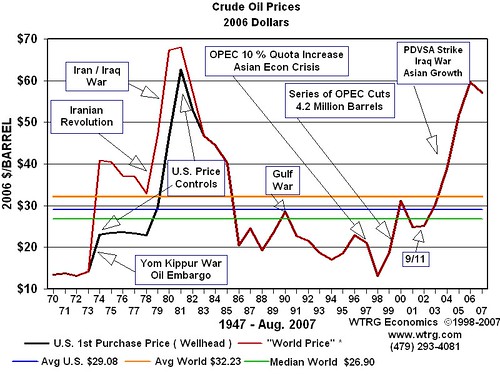The oil prices dropped to the lowest level in more than four years after China implemented retaliatory duties in response to US measures taken earlier this week.
China announced that it would impose an additional 34% tariff on any goods imported by the US. This is a major escalation in the trade war.
The move is set to go into effect on April 10 and comes in response to Donald Trump’s decision, made recently, to increase tariff barriers to levels not seen for over a hundred years.
Globally, nations are preparing for a possible trade war. They have been preparing to retaliate against US protectionist policies.
Trump’s tariffs shock the world
Imposition of tariffs sent shockwaves throughout the world’s financial markets. This led to an immediate drop in confidence among investors and sharp drops in stock values.
Trade wars initiated by US have disrupted supply chains around the world and caused uncertainty.
As tensions escalate between two of the largest economies in the world, concerns have been raised about the possibility of a global recession. This has led to calls for the de-escalation the trade dispute.
Brent crude oil futures at the Intercontinental Exchange are currently trading for $65.05 a barrel. This is a 7.3% decline.
West Texas Intermediate Crude Oil on the New York Mercantile Exchange fell 8% to $60.68 a barrel.
The benchmarks have fallen to the lowest levels since April 2021, when the COVID-19 pandemic was at its peak.
The contracts also had their lowest percentage losses for over two years.
Oil demand continues to decline
Carsten Fritsch is a commodity analyst with Commerzbank AG. He said that there are fears the tariffs could lead to an even further lowering of the oil demand. This is especially true since China has been particularly affected by the reciprocal duties.
Fritsch added:
The other countries could respond with counter-tariffs to US tariffs. This would set off a downward spiral in tariffs and put more pressure on the demand.
China’s aggressive reaction to US tariffs has made the global trade war inevitable.
The conflict is likely to stifle the economy and decrease demand for commodities such as crude oil and refined goods.
Ole Hansen, head of Saxo Bank’s commodity strategy department, says that there are no winners to this trade war.
The US is exempted from tariffs for energy imports, including crude oil from Canada and Mexico.
Fritsch, a Commerzbank analyst, said that the demand for Canadian crude oil may fall short-term as US refineries are reportedly buying in advance in anticipation of new tariffs.
The US Energy Information Administration reported that US crude oil imports to the US from Canada rose by 11% during the past reporting week. This is the highest level since January.
OPEC+ is in a tough spot
The decline in oil prices has been accelerated by the decision of the Organization of Petroleum Exporting Countries (OPEC) and its allies to increase output dramatically in May.
According to a statement, eight members of the OPEC+ coalition decided at a meeting held on Thursday to boost oil production in May by 411 000 barrels per day.
In April, the eight countries, which include Saudi Arabia, Russia and Kuwait, will unwind a portion of the voluntary production cuts of 2.2 millions barrels a day.
After months of voluntary production reductions, this month the cartel plans to increase its oil output by 135,000 barges per day.
If you consider the dramatic drop in oil price on Thursday, it is not surprising that OPEC+ has decided to join forces.
In its press release, OPEC+ cites the positive outlook for the market and current healthy fundamentals to justify the decision.
Fritsch stated that it is “possible” the decision had been made before US president Trump’s tariff announcements sent oil prices tumbling.
The previous increase in price to USD75 could have misled you, because it was due primarily to sanctions.
In some ways, the decision of OPEC+ on Thursday seems to need revisiting. Oil prices around $60 per barrel will make the cartel uncomfortable.
The next step of OPEC will be very interesting, as it stated on Thursday that “the supply increase can be paused or reversed depending on the evolving market conditions.”
The post Oil Prices Sink to Over 4-Year Low on Tariff Concerns; OPEC+ In a Pickle? This post may change as new information becomes available
This site is for entertainment only. Click here to read more






